Players share tales of historic Man Utd season
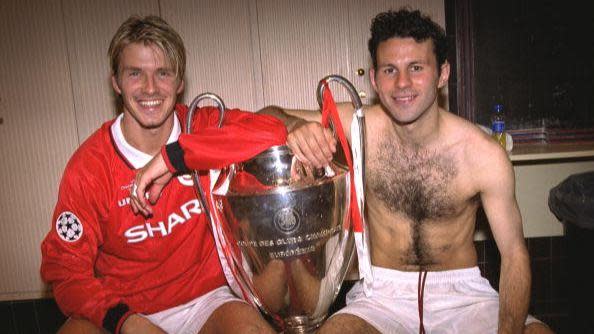
Former Manchester United midfielder David Beckham says he had “no choice” but to “work hard” and “stop people saying what they were saying” after he became a pariah at the 1998 World Cup.
In summer 1998, Beckham became a scapegoat for England’s failure in the World Cup after he was sent off during a last-16 loss to Argentina.
The following season, he helped his club lift a historic Treble of Premier League, FA Cup and Champions League. No other English team were able to repeat that same trophy haul within a single campaign until Manchester City did so in 2023.
A new documentary, ‘99, tells the story of Manchester United’s most successful ever season, with contributions from United legends including Sir Alex Ferguson, Peter Schmeichel, Beckham, Ryan Giggs, Paul Scholes, Gary Neville, Andy Cole, Ole Gunnar Solskjaer, Teddy Sheringham and Dwight Yorke.
The film tells the story of some of the bumps in the road on the way to glory, with Beckham saying they “had so many difficult moments throughout that season”.
Former chairman Martin Edwards reveals Ferguson temporarily offered his resignation at the beginning of the campaign. Schmeichel says he had considered leaving in 1997 because of the team’s European record. Cole unpicks some of the major bust-ups that took place in the dressing room and Ferguson’s assistant coach Steve McClaren discloses what the boss said to him after Sheringham’s goal in the Champions League final.
Here are just a few takeaways...
Ferguson resigned at the start of the 1998-99 season
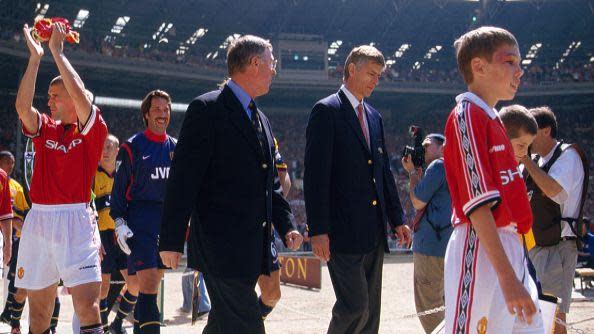
Under Ferguson, United won four of the first five Premier League seasons after its formation in 1992.
However, former chairman Edwards explains some doubts crept in when United were deposed by Arsene Wenger’s Arsenal team – who won the league and FA Cup double in 1997-98.
Arsenal also beat United 3-0 in the 1998 Charity Shield.
Edwards says he feared Ferguson had become a little too involved in “outside interests” including horse racing. The chairman wrote a letter to the manager before the start of the 1998-99 campaign, which he describes as a “correction”.
According to Edwards, Ferguson promptly “offered his resignation” before coming back the same afternoon to withdraw it.
“It was never mentioned again after that,” says Edwards.
The 1999 Treble: Five games that helped Man Utd win Premier League, FA Cup & Champions League
Man City documentary Together: Treble winners shows lighter side of players
Cole 'lunged' at Sheringham; Keane was already 'trying to fight' him
Cole has previously claimed he never spoke a single word to his striking partner Sheringham during the four years they played together at United. He says their feud started in 1995 during Cole’s England debut against Uruguay. According to the forward, Sheringham refused to shake hands as Cole entered the pitch to replace him.
During the documentary, Cole claims it almost got physical between the pair at one point. After Sheringham had apparently blamed him for conceding a goal, Cole says he “lunged” at his team-mate.
However, club captain Keane had got in there first and was already “trying to fight” Sheringham over a separate disagreement.
Cole scored 121 goals for United and is fourth on the list of all-time Premier League goal scorers.
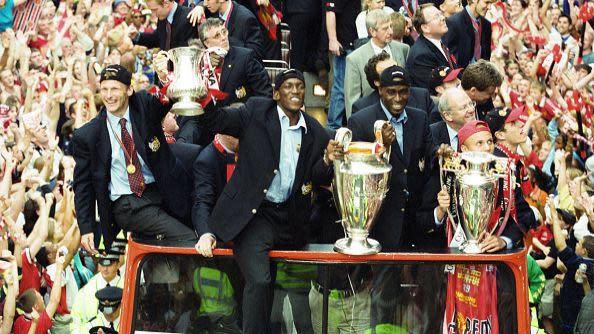
Schmeichel considered leaving in 1997 over European form
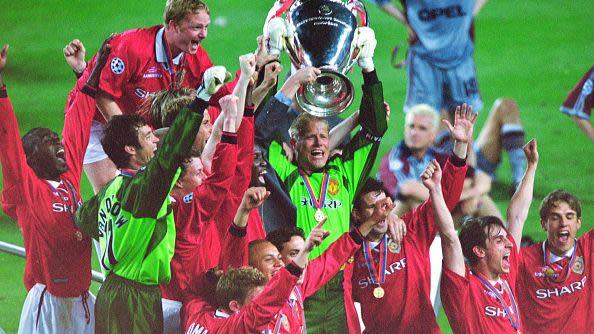
Schmeichel spent eight years at Old Trafford, winning 13 trophies under Ferguson and being named Premier League Player of the Season in 1995-96. Despite a dip in form, it was a major shock when the then 34-year-old announced he would be leaving at the end of the 1998-99 season.
However, in ‘99, Schmeichel reveals he had considered moving on earlier. In 1997, the Danish keeper claims he told his manager that he was “very, very tempted” by an offer from “another big club”.
Schmeichel explains his reasoning was that he “didn’t feel” United could “win in Europe”.
In 1997 United were beaten in the Champions League semi-finals by eventual winners Borussia Dortmund and in 1998 they were beaten on away goals by Monaco.
Starting XI in Champions League final did not feel right
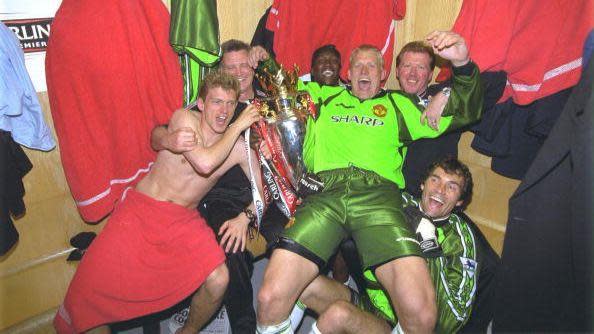
When Ferguson announced his team for the Champions League final against Bayern Munich, there were a few raised eyebrows, including from within his own camp.
Both Paul Scholes and Roy Keane were unavailable through suspension but even disregarding that, the team looked unusual. Swedish winger Jesper Blomqvist started on the left wing, which meant Giggs was moved to the right and Beckham into central midfield.
Blomqvist had deputised for Giggs on plenty of occasions during the season but only scored once in all competitions.
Meanwhile, Giggs says that right wing was “not a position that I enjoyed playing at all”.
McClaren reveals he tried to convince Ferguson to reconsider his team, but that his manager insisted he had already told Blomqvist he would be playing.
Schmeichel says the team felt “unbalanced” and full-back Denis Irwin says he would “never have called” that selection.
Meanwhile, defender David May, who was left out of the starting XI, says there were “a few things” he wanted to say to his manager but “wouldn’t” and “couldn’t” because of the respect he had for him.
United were frustrated for much of the match. When Sheringham replaced Blomqvist after 67 minutes, Beckham was returned to the right wing and with five minutes to play, Giggs moved back to the left.
Right-back Neville says that’s when “things started to feel normal”.
'This game’s not over'
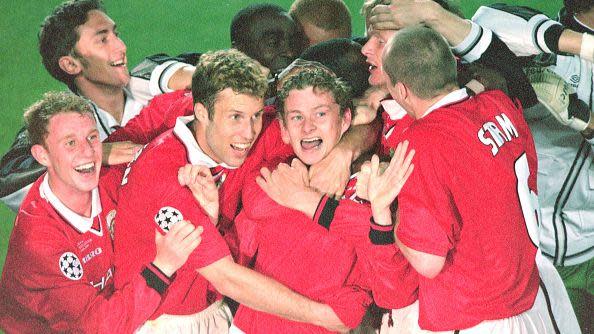
United looked dead and buried until substitute Sheringham turned in a corner in the 91st minute.
Amid the relief, McClaren says he approached his boss to discuss tactics for extra time.
Apparently, Ferguson’s response was: “This game isn’t over Steve, sit down.”
Just moments later, Ferguson’s second substitute Solskjaer converted a corner to win the game and secure Manchester United’s second European Cup, 31 years after Sir Matt Busby had won their first - and on what would have been his 90th birthday.
Solskjaer says his “mind had lived that winning goal so many times” but the real thing was “on a different scale”.
Beckham says: “I want that feeling again. I can never have that again.”
